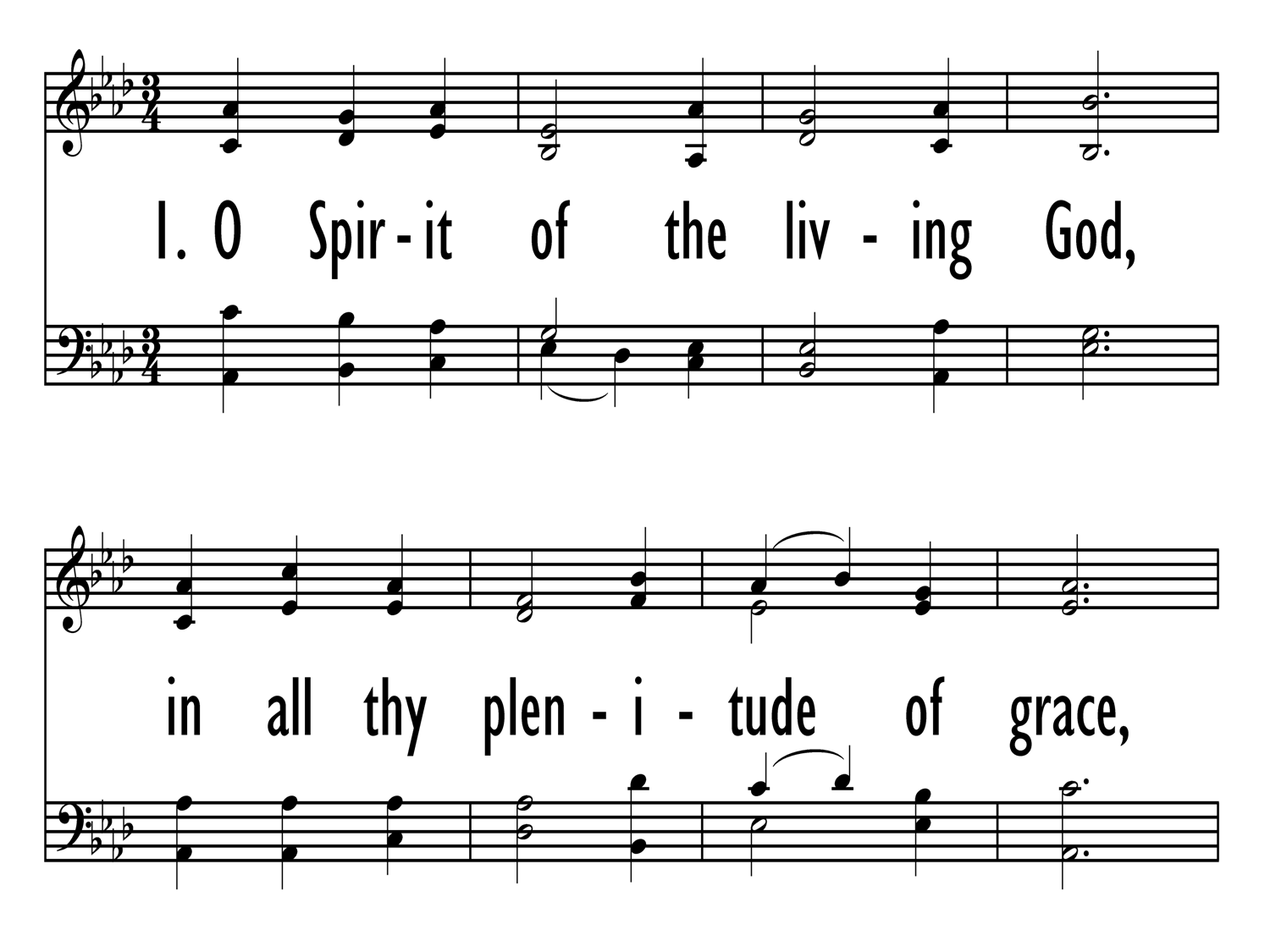- |
User Links
O Spirit of the Living God


O Spirit of the living God, In all Thy plenitude of grace
Author: James Montgomery (1823)Published in 372 hymnals
Printable scores: PDF, MusicXML
Audio files: MIDI, Recording
Representative Text
1 O Spirit of the living God,
in all the fullness of your grace,
wherever human feet have trod,
descend upon our fallen race.
2 Give tongues of fire and hearts of love
to preach the reconciling word;
anoint with power from heaven above
whenever gospel truth is heard.
3 Let darkness turn to radiant light,
confusion vanish from your path;
those who are weak inspire with might:
let mercy triumph over wrath!
4 O Spirit of our God, prepare
the whole wide world the Lord to meet;
breathe out new life, like morning air,
till hearts of stone begin to beat.
5 Baptize the nations; far and near
the triumphs of the cross record;
till Christ in glory shall appear
and every race declare him Lord! Amen.
Source: Ancient and Modern: hymns and songs for refreshing worship #257
Author: James Montgomery
 James Montgomery (b. Irvine, Ayrshire, Scotland, 1771; d. Sheffield, Yorkshire, England, 1854), the son of Moravian parents who died on a West Indies mission field while he was in boarding school, Montgomery inherited a strong religious bent, a passion for missions, and an independent mind. He was editor of the Sheffield Iris (1796-1827), a newspaper that sometimes espoused radical causes. Montgomery was imprisoned briefly when he printed a song that celebrated the fall of the Bastille and again when he described a riot in Sheffield that reflected unfavorably on a military commander. He also protested against slavery, the lot of boy chimney sweeps, and lotteries. Associated with Christians of various persuasions, Montgomery supported missio… Go to person page >
James Montgomery (b. Irvine, Ayrshire, Scotland, 1771; d. Sheffield, Yorkshire, England, 1854), the son of Moravian parents who died on a West Indies mission field while he was in boarding school, Montgomery inherited a strong religious bent, a passion for missions, and an independent mind. He was editor of the Sheffield Iris (1796-1827), a newspaper that sometimes espoused radical causes. Montgomery was imprisoned briefly when he printed a song that celebrated the fall of the Bastille and again when he described a riot in Sheffield that reflected unfavorably on a military commander. He also protested against slavery, the lot of boy chimney sweeps, and lotteries. Associated with Christians of various persuasions, Montgomery supported missio… Go to person page >Text Information
| First Line: | O Spirit of the living God, In all Thy plenitude of grace |
| Title: | O Spirit of the Living God |
| Author: | James Montgomery (1823) |
| Meter: | 8.8.8.8 |
| Language: | English |
| Copyright: | Public Domain |
Notes
O Spirit of the living God. J. Montgomery. [For Missions.] Written in 1823 "to be sung at the Public Meeting of the Auxiliary Missionary Society for the West Biding of Yorkshire, to be sung in Salem Chapel, Leeds, June 4, 1823." It was first printed on a fly-sheet for that meeting, and again in the Evangelical Magazine in the following August. After a careful and most successful revision it was published by Montgomery in his Christian Psalmist, 1825, No. 552, in 6 stanzas of 4 lines, and… Read More
O Spirit of the living God. J. Montgomery. [For Missions.] Written in 1823 "to be sung at the Public Meeting of the Auxiliary Missionary Society for the West Biding of Yorkshire, to be sung in Salem Chapel, Leeds, June 4, 1823." It was first printed on a fly-sheet for that meeting, and again in the Evangelical Magazine in the following August. After a careful and most successful revision it was published by Montgomery in his Christian Psalmist, 1825, No. 552, in 6 stanzas of 4 lines, and headed "The Spirit accompanying the Word of God; " and again in his Original Hymns, 1853, No. 257. It is usually given in an abridged form; but the text is seldom altered. As a hymn on behalf of Missions it has great merit, and is in extensive use in all English-speaking countries. The original text is given in the Churchman's Shilling Magazine, 1877.
--John Julian, Dictionary of Hymnology (1907)
Read LessTune
Also known as: ST. PHILIPS BENEDICTION GRANTON NAZARETH MELCOMBE was first used as an anonymous chant tune (with figured bass) in the Roman Catholic Mass and was published in 1782 in An Essay on the Church Plain Chant. It was first ascribed to Samuel Webbe (the elder; b. London, England, 1740; d.…
WINCHESTER NEW
The original version of WINCHESTER NEW appeared in Musikalisches Handbuch der geistlichen Melodien, published in Hamburg, Germany, in 1690 by Georg Wittwe. It was set to the text “Wer nur den lieben Gott” (see 446). An expanded version of the tune was a setting for "Dir, dir Jehova" (see 203) in…


 My Starred Hymns
My Starred Hymns







